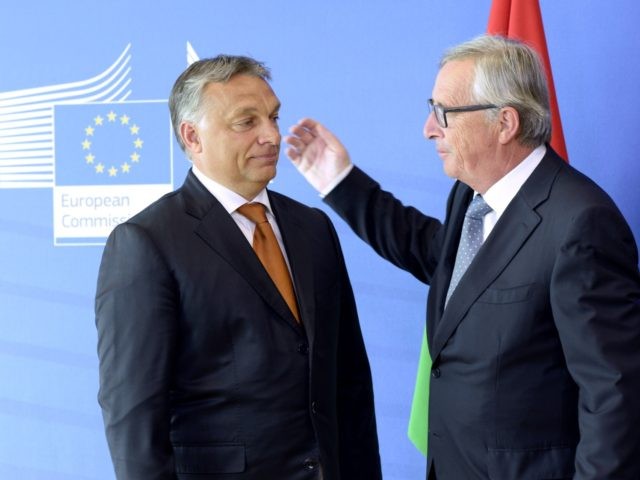European elites that mourn the loss of Britain — and the nation’s significant financial contributions — from the bloc have themselves to blame, Hungarian leader Viktor Orban has said in a wide-ranging interview with the German press.
While the British people voted to leave the European Union, it was the Eurocrats in Brussels steering the project whose choices had left the British feeling they had no choice but to go their own way, Orban said. Responding to a question by a journalist from German magazine FOCUS, asking him to elaborate on historic comments he made saying that Brexit could have been avoided, the Hungarian Prime Minister was clear that while the European Union could probably get away with pushing around less powerful nations, a leading state like the UK would inevitably decide to do something about it.
“You can’t behave like that with one of the world’s largest economies, a nuclear power and a member of the Security Council”, Prime Minister Orban said. Given the United Kingdom did vote to leave the European Union in 2016 and finally completed its withdrawal in 2021, taking with it the £11 billion net the country sent to Brussels annually, the Hungarian leader asked sardonically of Brussels: “Was it worth it?”
One of the examples cited by Orban was when the European Union served its own narrow ends rather than trying to build bridges with London was the selection of Jean Claude-Juncker as European Commissioner in 2014. This move was in the face of extremely strong protests from London, which partnered with Budapest to oppose the move.
This was more than a simple clash of personalities — then-UK Prime Minister David Cameron knew Juncker was a strongly pro-Eurofederalism candidate, a direction for Europe that was very unpopular among British voters. He also feared — rightly — Juncker would block positive reform of the bloc during a time where Cameron needed the EU to look as good as possible to the British people.
Both suspicions came to pass. Indeed, David Cameron’s last-ditch attempt to get serious reform of the UK’s relationship with the EU in 2016 to take back to the British people as evidence they could safely vote to stay in the bloc in that year’s referendum was broadly interpreted to have been a failure. The EU — led by Juncker — showed at that time it both was not interested in meaningful change, and clearly believed the British would not vote to leave anyway.
While Hungary believed the EU was disadvantaged by Britain leaving the bloc — Hungary is a beneficiary of European cash, which the UK helped pay for, the UK is a net contributor to global security, and London was a top freedom of movement destination — the Hungarian government has always taken the view that it was a matter for the British alone, and that it would be an advantage for the British to be free. Nevertheless, although the Hungarian government isn’t agitating to leave the EU, it wants to see the bloc move in the destination once envisioned by Britain’s leadership — less centralised, controlling, and bureaucratic.
Asked about the European Union’s — failed — approach to acquiring coronavirus vaccines by FOCUS, Mr Orban made clear that the centralised approach had failed. While the journalist asked: “Brussels has sent the following message: ‘Look, we’re stronger together than as individual Member States.’ In other words, Europe functions as a united, centralised state. Are you convinced by this strategy?”, the Hungarian Prime Minister replied:
No. The value of any strategy lies in how successful it is. In those areas in which joint action brings about success, we must take joint action; wherever a national path brings about success, that is the one which must be pursued. We’ve sought to do something together that we could have managed more successfully on an individual basis – take a look at the examples of Britain or Serbia.
Orban was also quizzed more broadly on Europe’s economic development. There, he made clear again that Europe’s centralising mission — which beyond a centralized currency and bank, is now drifting towards central Brussels-set budgets as well — was failing and leaving a two-speed Europe. This was down to a differential in culture, Orban explained, retreading his oft-repeated refrain that central Europe’s occupation by Soviet communism in living memory inoculated voters in those countries against the seduction of socialism in a way that Western Europe could not understand.
This, the Hungarian leader said, left Western Europe vulnerable. He told FOCUS:
Here, in Central Europe, things are going well. All our economic indicators are excellent, and our national budget is as it should be. Our work-oriented policies have helped us towards almost reaching full employment, and we’re also making good progress in the sphere of digitalisation. In the West there are too many economic policies reminiscent of socialism, with tax increases, complicated regulations, and measures disadvantaging capital and enterprise. The EU should do far more to promote improved competitiveness; but regrettably its share of global economic production is declining, and we find this alarming.
As Breitbart London already reported, Mr Orban did not limit his condemnation of the EU to these matters. His most searing criticism was withheld for Brussels’ handling of the Europe Migrant Crisis, which he said had turned the Mediterranean sea into a cemetery of migrant bodies — people who didn’t have to die but who were lured into great danger by callous people smugglers trading off Europe’s weakness.
Read more at Breitbart London.

COMMENTS
Please let us know if you're having issues with commenting.